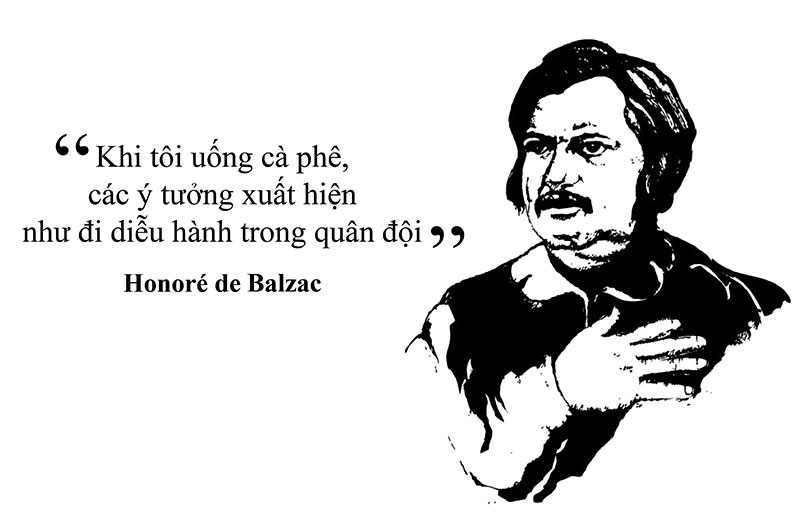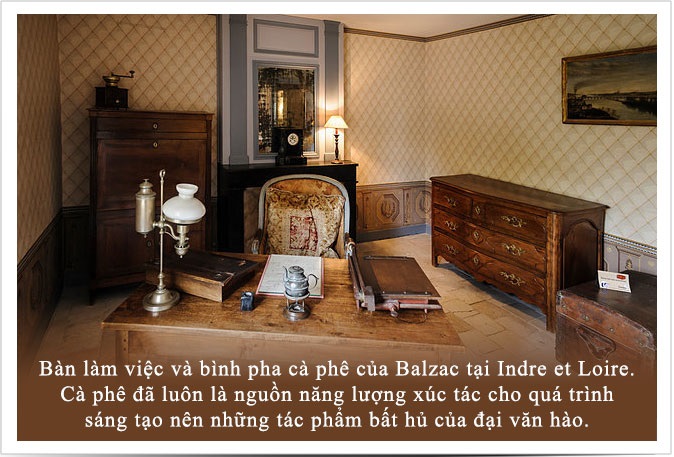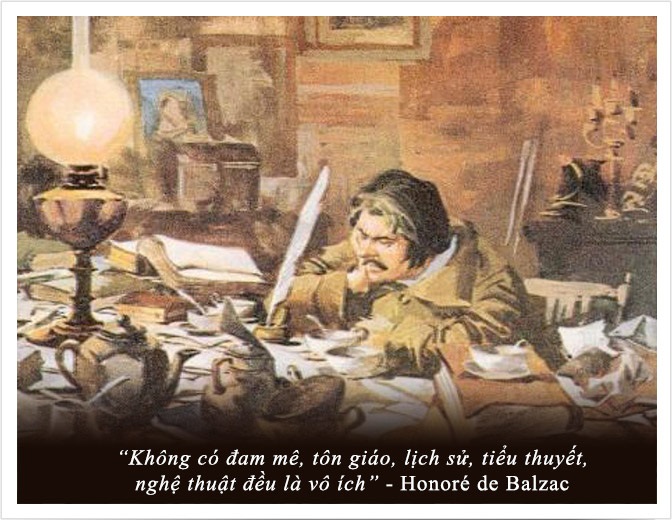Article 17: Honoré de Balzac “When I drink coffee, ideas appear”
In the process of creating the future, coffee has played the role of a nourishment of the spirit, of the mind, of the heart and an agent of sublimation of the life of man himself. One such example is the great writer Honoré de Balzac.

“When I drink coffee, ideas march in like the army” – Honoré de Balzac
The Japanese have positioned the Tea Ceremony as a national ethic, an art of living conveyed through enjoying a cup of tea. Meanwhile, Vietnam – a coffee powerhouse in the world, has the best Robusta coffee beans in the world, has a long herritage of coffee culture for hundreds of years; and yet, Vietnamese coffee is still in the low-end market segment, mainly exported raw and has not been properly positioned as it should be in the perspective of an industry and a nation.
With the desire to bring Vietnam’s coffee industry to a new level, pitching the value of coffee not only as a common drink but as cultural coffee, art coffee, spiritual coffee… all the way to philosopher’s coffee, worthy of the status of the world’s coffee powerhouse – Trung Nguyen Legend Group has dedicated time and passion for many years researching history, culture, art… coffee from all walks of life so that coffee could be become “Coffee of Philosophy”.
On the Trung Nguyen Legend’s creative and development journey, the spirit of commitment to serving the community has always been at the core throughout with many initiatives to Create Great National Aspirations and Great National Intentions; in order to reposition Vietnam’s coffee industry on the world coffee map and on this journey, Trung Nguyen Legend wishes to join hands with national strategists so that Vietnam will soon become a strong nation that influences the world!
The Japanese did it!
The Vietnamese can do it too and do it better!
“I will become a great writer”
Honoré de Balzac was born in 1799 – the year the French Revolution won, contemporary intellectuals were more deeply aware of the aspiration for innovation, not only of individuals or a field, but of the overall transformation of society to create an era of humanity, reason and freedom. Growing up in an era of constant creative movement, Balzac soon had the mentality and desire to become a world changer.
Balzac is not a natural genius. Since childhood, he lived far away from his family and mistakenly thought he was abandoned. Balzac tried to cope with the feeling of loneliness by reading frantically, reading every religious, historical, literary, philosophical, physic books… which he had access to. The more Honoré de Balzac read, the more he thought about the mission of human life, the role of man in society, the world and the universe. In other words, the entire outlook on life had changed. In his mind, Balzac aspired to recreate a complete society in all aspects, which he likened to “the architecture of the universe”. A “universe” created by himself.
Somewhere in the books, Honoré de Balzac captured typical personalities, a system of spatial and temporal data linked into a storyline. He wrote down all his ideas and dreamed of “I will become a great, famous and loved writer“.
However, when Honoré de Balzac expressed his wish, he was ridiculed. Teachers and friends did not believe that he could realize such an ambition. His family prevented him because they wanted him to study Law to inherit the family business. Having suffered too much criticism, Balzac suppressed his hurt and accepted to study Law at the will of his parents.
Living the life he did not want, Honoré de Balzac tried to find answers about the mission of each person. Unable to live like a machine, at the age of 21, Honoré de Balzac decided to give up Law to fulfill his aspiration to become “a great writer“. It was a very difficult period in Balzac’s life, no one encouraged, ignored by his family with a poor life in a loft in the middle of Paris.
Contrary to the opinion of his family that he would give up when things got tough. Honoré de Balzac felt happy to be living his passion, continuing to build the universe he always dreamed of. In a letter to his sister, Honoré de Balzac wrote that “I have clearly seen my destiny. Destiny can only be achieved after overcoming the most difficult obstacles with one’s own strength. I will create my own era.”
In those years, Honoré de Balzac often went to cafes – where literary talks took place, immersed in the breath of the times, observing contemporary social developments through comments inside those cafes. Contemplate, reflect and create endless stories.

Balzac’s desk and coffee maker at Indre et Loire. Coffee had always been the source of energy that catalyzed the creation of immortal works of the great writer.
Honoré de Balzac keeps creativity flowing and sanity sublimated with Turkish-style coffees. His life seems to revolve around the language of literature, books and coffee. Balzac drinks up to 50 cups of coffee a day. In the essay “The Pleasures and Pains of Coffee”, the great French writer wrote that he could not live without coffee. Balzac asserts, coffee is a legendary source of creative energy, enjoying coffee is an absolute necessity for imagination to create miracles: “When I drink coffee, ideas appear and march in like the army.”
“There is no great talent without a strong will”
Honoré de Balzac entered the literary arena with a heart full of enthusiasm. However, life continuously poured down challenges. The first works were not appreciated, not enough money to cover the most basic needs. In order to survive, Balzac borrowed money to open a printing house, publishing books, newspapers… Despite his best efforts, after 3 years, he went bankrupt and could not pay his debts.
Deep in the tragedy had unleashed all the will power and potential competence in Balzac. He completely focused his creative energy on literature and wrote non-stop. Honoré de Balzac was like a different person, full of energy and working in a state of ecstasy that amazed others.
At this time, with historical fiction and the growing romantic movement, Balzac found a different style for himself. He reflected reality into the novel in a way that reproduced the typical examples of society. His works described the activities of society, not merely the historical flow, but showed to the end the causes of all situations, forms, and motivations that promoted characteristic and aspirational transformation of the times. It can be said that literature – history – philosophy were in harmony.
Under his creative pen, a series of works such as Glory and Misfortune (1829), The Wild Ass’s Skin (1830-1831), The Unknown Masterpiece (1831), Eugénie Grandet (1833), Old Father Goriot (1835)… came into life, making Balzac the greatest French realist writer in the first half of the 19th century, whose fame resonated around the world.

“Passion is universal humanity. Without it religion, history, romance and art would be useless.” – Honore de Balzac.
The “architecture of the universe” that he aspired to be crystallized in La Comédie Humaine (The Human Comedy) series – a work that was considered a chronicle of France in the early 19th century. Covering La Comédie Humaine is the extremes of good – evil, spiritual life, the spiritual world and scientific thinking harmonizing with each other, clarifying human changes in social movement.
The universe in La Comédie Humaine series is not only 2,209 closely linked characters, but also the universe in each person. For Balzac, the miraculous spiritual power of man is a secret of the universe that needs to be discovered to the end. Balzac’s work is respected as a mirror for people to look at, discover good and evil in personality, thereby improving themselves to build a better society. Therefore, La Comédie Humaine was honored as a unique literary galaxy of great value to the human literary treasure.
It is no coincidence that coffee and coffee shops in France in the 18th century and the first half of the 19th century were associated with the role of “Awakening Humanity”. Enjoy coffee and contemplate to understand more the meaning of human life and social life. From seeing reality with a purpose beyond itself, to seeing through one’s own desires. After all, coffee is not merely a drink but mainly a nutrient of the spirit, of the mind and of the heart. People need coffee as an agent that brings a sense of the ability to sublimate their own life.
*Coming up: Philosopher Jean-Jacques Rousseau and the social aspiration “people should be Human”


